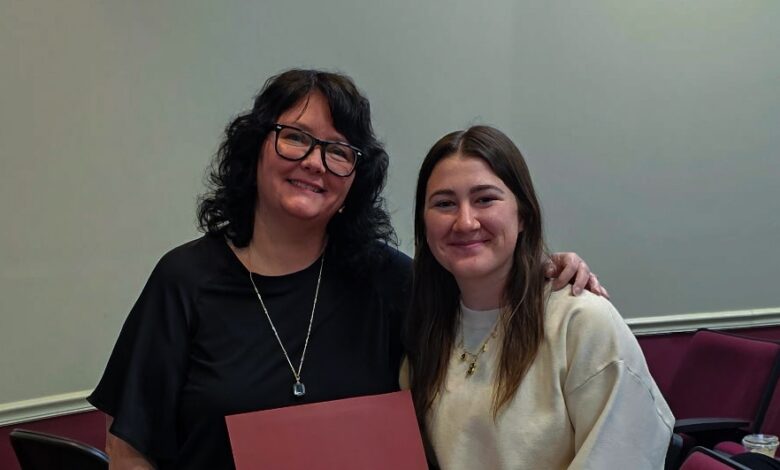
43rd GSS Colloquium centers on reproductive justice
By Grace Bertrand
Rider hosted its 43rd annual Gender and Sexuality Studies Colloquium on April 1. This year, students, faculty and staff gathered in the Rue Auditorium to learn about a timely topic in gender studies: reproductive justice.
Every year the colloquium includes three student panels, an awards presentation and a poster session featuring students. This year the GSS department added a documentary film screening, a Q&A panel with the film’s directors and a donation drive.
GSS Director Erica Ryan expressed her desire to offer something more engaging for students rather than the usual speech or keynote address.
“In this moment where reproductive justice feels sort of more perilous in terms of its existence than ever before, we wanted to choose a documentary that really encourages people to think about not only the kind of ‘hot-button’ issue of abortion, but actually about the texture of people’s lives,” Ryan said.
The film, “On the Divide,” follows the story of three Latinx people in McAllen, Texas, who have to learn to navigate around a shared place of interest: the last abortion clinic on the U.S. and Mexico border. The three individuals, with different views and beliefs surrounding abortion, find themselves having to figure out their place in a community that is overwhelmingly against abortion.
“[The protagonists] really show this nuance and kind of gray area that you don’t often see when speaking about abortion and in the media,” Maya Queva, one of the film’s directors, said during the Q&A.
Throughout the film, threats to the clinic and the protagonists’ safety are showcased to also highlight their personal situations which were three-dimensional and did not fit neatly into one label or another.
“We wanted to eliminate those labels in a way to make it clear why choice and access to reproductive justice is something that shouldn’t be divisive and it shouldn’t be black and white, and you can believe in God and still want that and you can not want that for yourself but still want that [choice for others],” Queva said.
Prior to the Q&A portion of the panel with the filmmakers, awards were distributed to students and staff of the Rider community who made an impact in the field of gender and sexuality.
Jonah Friedman, a counselor at the Rider Counseling Center, was awarded the 2025 Ziegler-Gee award for his work as the LGBTQIA+ specialist at the center and for founding and facilitating Roy. G. Biv., a safe space for LGBTQIA+ students to receive support as a queer person.
The 2025 Virginia J. Cyrus Scholarship was also presented to Samantha Killin, a junior psychology major, who completed extensive research on the sexism and homophobia found in sports and more recently, the place transgender people have in Division I teams.
The three student panels revolved around the theme of reproductive justice with panels named “Gender, Sex, History and Politics,” “Sexed Bodies in Science and Social Science” and “Feminism and Sex in the Arts.” Each panel consisted of five individual student presentations.
The colloquium also featured its first donation drive for period products in an effort to mitigate menstrual poverty, an initiative brought on by senior psychology major Sarah Dickstein. Dickstein strives to bring awareness to the issue of period poverty in low-income communities and states that have the pink tax, a gender-based price discrimination on certain female products.
“It’s definitely something really important because even menstruation itself isn’t really talked about that publicly because it’s very shameful,” Dickstein said. “It’s important to start having open conversations about it so that costs and capitalization around these products can start to lessen.”
All the period products will be donated to Younity, formerly known as Womanspace, the leading nonprofit agency serving victims of domestic violence and sexual assault in Mercer County. Dickstein expressed her admiration for the agency, having donated to them for a previous community action project for a GSS course.
The donation drive also connected to Dickstein’s student panel called “Breaking the Cycle: Awareness of Period Poverty,” a presentation that educates audiences on the financial burden, stigmas and multicultural aspects of having periods.
Dickstein emphasized the importance of educating people on topics like abortion and periods at a time when policies are being created that impact these issues.
“[Conversations about reproductive rights] are getting circulated throughout the political climate and it needs to be in a place where there’s autonomy over it, instead of people who don’t really have much education on the matter,” said Dickstein.


